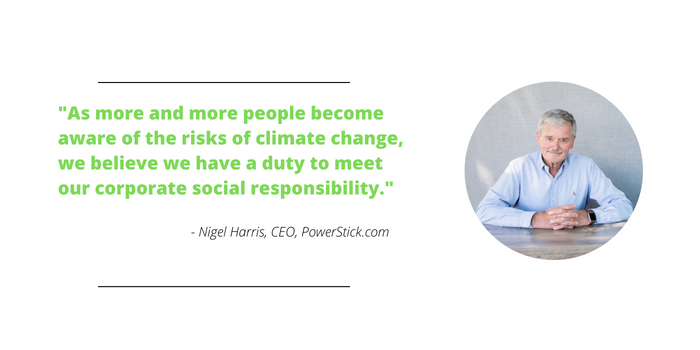3 Steps To Getting Started With A CSR Practice

In recent years, consumers have become more socially conscious. Issues like climate change, income inequality, unfair labor practices and gender inequity are hot on their radar, and companies are playing catch up.
Today, businesses are embracing corporate social responsibility practices (CSR). An estimated 90% of companies on the S&P 500 index published a CSR report in 2019, compared to just 20% in 2011.
CSR refers to the concept that a business is not only responsible for creating value for shareholders, but should also seek to better the broader community. It’s not just charity, because CSR programs also offer companies a competitive edge.
A 2019 survey found that 77% of consumers are motivated to purchase from companies committed to making the world a better place, while 73% of investors state that efforts to improve the environment and society contribute to their investment decisions.
Ontario-based supplier PowerStick.com partners with One Tree Planted, a nonprofit organization that helps businesses make an impact by planting trees around the globe. For every order from PowerStick.com, one tree is planted.
CEO Nigel Harris says there was no downside to committing to this program. “We attach a lot of importance to the design and quality of our products and to regular increases in our revenues. However, we want our brand to be recognized for more than just innovation and commercial success.
“As more and more people become aware of the risks of climate change, we believe we have a duty to meet our corporate social responsibility. By planting a tree for every order, we tell our customers that we care deeply about the environment and that we are doing our bit for a sustainable future.”

Socially responsible initiatives are also essential to business development and innovation. With a focus on CSR, new solutions and eco-friendly alternatives are more possible. Harris says, “We saw how this program was received by our distributors and the importance they and their customers attached to it. We have continued this path to sustainability and commitment to the environment by launching our EcoCollection product line.
“Its initial two product offerings are made from recycled plastic and wheat straw plastic and have been extremely well-received by our customers. We intend to introduce sustainable versions of some of our existing products, as well as new and solely eco-friendly ones.”
Kevin Kanimyar, marketing expert, social activist and founder of Yellow Tree Marketing, says there are three steps to building a successful CSR program.
First, pick an initiative that is simple yet concrete and impactful. Start small. Kanimyar says, “Small change can spark medium change which lights big change, then ignites even bigger change. It’s a cycle. There’s nothing grandiose to planting one tree. But if everyone is planting trees–ethically and responsibly—then day by day, a real impact can be seen within the ecosystem. People also crave connection.
“Feeling tied to something in even the smallest way—whether it’s an exchange of stories at lunch or being the one to make the million‐dollar donation, being part of something that’s bigger than yourself is a physical and emotional way people feel more engaged and motivated to drive further action.”
Second, choose the right plan of action and/or mission partner. But each plan of action must include passion and heart, says Kanimyar. “Without the passion, there is no motivation to make real change. So, no matter the social impact project a company dedicates themselves to, there needs to be the care and dedication for it to be seen through.”
Lastly, use your brand messaging to drive a call to action to inspire more impactful change. “The call to action is the bread and butter of any sustainable CSR program,” Kanimyar says. “People also want to be given something to do. They see the issue and the cries for help and then think, Well, what now? What can I do about it? Companies must provide the call to action and next steps for them to further reach their goals.”
CSR can no longer be an afterthought. For business leaders who think it’s a waste of their time, Harris says, “At their cynical worst, they put down such programs as simply greenwashing. At best, they are being short-sighted and missing a huge marketing opportunity to show their audience what they truly value. Thankfully, they are in the minority as we have seen a number of suppliers in this industry follow our lead.”

